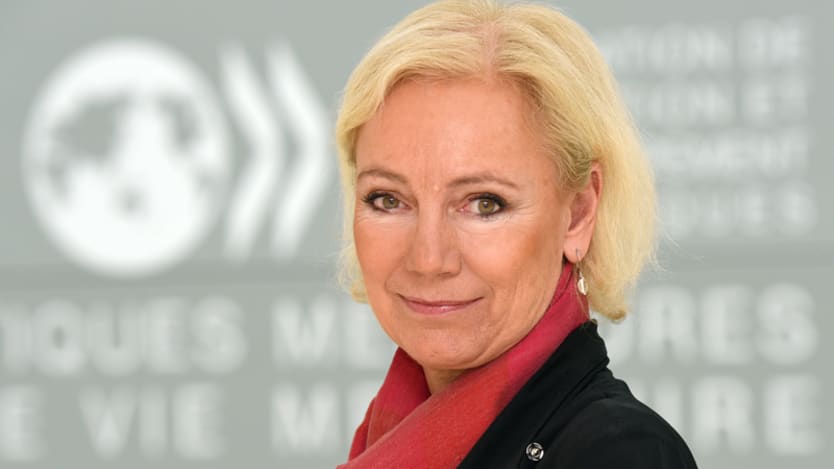
The British government’s manifesto pledge to try to change the rules around using official development assistance for security purposes “is not up for discussion,” the chair of the Organization for Economic Co-operation and Development’s Development Assistance Committee, Charlotte Petri Gornitzka, has said.
The ODA rules are determined by the 30 members of the committee and were last amended around security in 2016, allowing for more security-related spending and spending on “countering violent extremism.”
The U.K.’s Conservative Party — which had pushed hard for those changes — included a commitment to further reforms in their manifesto ahead of June’s snap election. But in a conversation on June 26, Petri Gornitzka told Devex that there are too many other priorities to consider yet another change to the rules.
“The rules regarding security-related costs are not up for discussion,” she said. “There are other items on the table right now within the DAC regarding in-country refugee costs and private sector instruments, for instance.”
See more Devex coverage of the future of DFID:
► New DFID funding for East Africa crisis welcomed, raises questions
► Every $1 of UK aid increases UK exports by $0.22, study finds
“We don’t want to take new decisions every year; that would be a weakness in itself,” she said when asked in a previous interview with Devex in February about pressure from the U.K. to alter the rules. “For that reason I think that perhaps we need to take in other political realities; the development reality being the foreign ministries’ level of commitment when we prepare decisions.”
“I think we need hardcore commitment around the table on this, and I think it’s going to be tough,” she said.
Petri Gornitzka had opposed the changes in 2016, when she was head of the Swedish aid agency.
One member of a major U.K. nonprofit, who asked to remain anonymous to protect professional relationships with the U.K. government and the OECD, said: “The U.K. led the call for these rules to be reformed, which is why I would suggest they will have trouble reopening discussions on these very same issues.”
The changes currently under debate center on allowing the use of ODA to support refugee resettlement within donor countries; expanding the types of financial instruments that can be used to spend ODA; and establishing a methodology to calculate how much governments can spend through those instruments.
“There is also ongoing work to update the coefficient for the proportion of [United Nations] peacekeeping contributions that can be reported as ODA — this is currently 7 percent, but is likely to increase,” the source said.
In its manifesto, the U.K. government had threatened to break with the DAC rules altogether if a consensus could not be reached. But former head of the U.K. Department for International Development, Andrew Mitchell, said he believes it won’t come to this.
“My view is that we should negotiate with our colleagues — it’s 30 people on the OECD [DAC] — to get these minor tweaks made and I’m pretty confident that that will be possible,” he said during a panel discussion about election manifesto commitments related to development at the Overseas Development Institute on June 1.
“I don’t expect it will be necessary for Britain to amend the law, but clearly in that situation, that will be a matter for parliament to decide,” he said.
Without DAC consensus, the U.K. government must first seek a vote in parliament to break with the rules. If parliament agrees, the government could then outline its own rules for what counts as aid spending, shifting the goalposts for its commitment to spend 0.7 percent of gross national income on ODA.
“If they were to go down the unilateral track, I don’t think the U.K. would necessarily fall out with the DAC — it would mean they just engage with it on a slightly different basis,” the nonprofit source said in a phone interview.
“From our perspective, the big risk [is] ... it could significantly undermine and weaken the governance of the aid system by the OECD, and the commitment to the OECD’s regulation of the aid system, which at the end of the day isn’t legally binding but based on the consensus of its members,” he said.
Petri Gornitzka, who took the post last year, stressed in February the importance of respecting and protecting the aid rules from political interests.
“It was hard enough to take the [first] decision to amend, and it was a balancing act, and people can live with it and I can live with it,” she told Devex.
Safeguarding ODA “is going to be a bit of a fight,” she added. “When you see that there are other discussions going on that want to go further on security costs, for instance, and aren’t really interested in finding out whether it’s OK with the DAC decision, which is still a recent decision … some of the bigger DAC members think, ‘well that’s just the DAC,’” she said.
For more U.K. news, views and analysis visit the Future of DFID series page, follow @devex on Twitter and tweet using the hashtag #FutureofDFID.
Search for articles
Most Read
- 1
- 2
- 3
- 4
- 5








